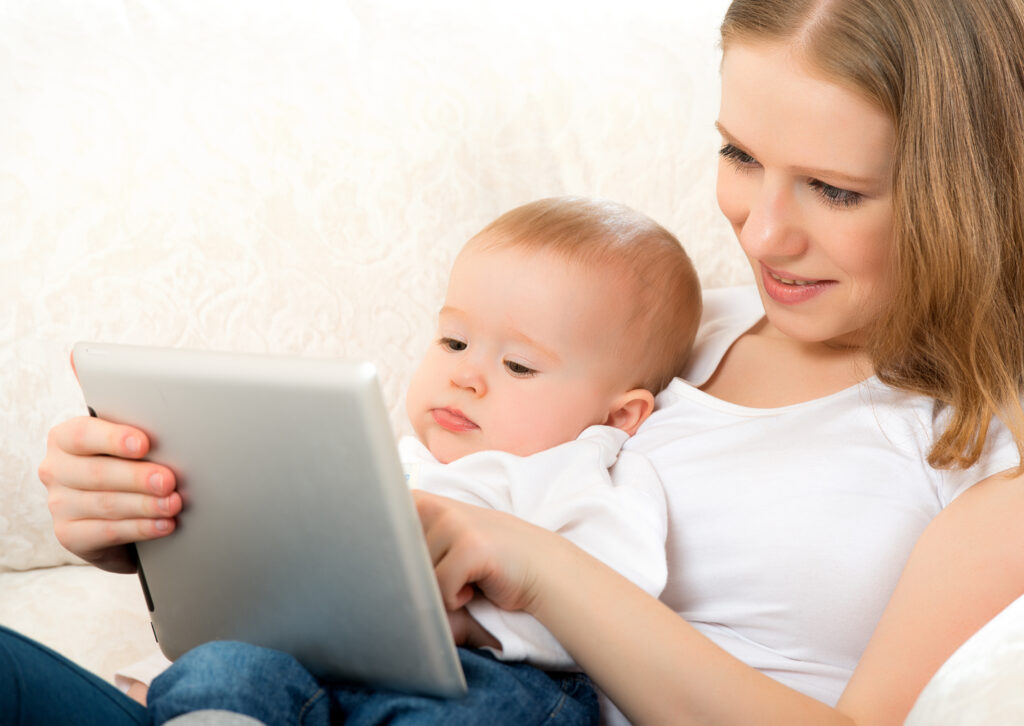In our digital age, technology is an integral part of daily life, and its impact on children’s development has been a topic of increasing concern. Parents often wonder how much screen time is appropriate for their young children and what the implications of excessive technology use, including exposure to blue light, may be on attention and overall development. In this article, we’ll delve into research to provide guidelines on screen time for babies and children aged 1 to 5, along with insights on technology’s effects on attention.
1-Year-Olds:
- Screen Time: The American Academy of Pediatrics (AAP) recommends no screen time for children under 18 months except for video chatting.
- Blue Light: Exposure to blue light can disrupt sleep patterns, which is critical for infants. Avoid screens at least one hour before bedtime
2-Year-Olds:
- Screen Time: Limit screen time to high-quality, educational content. AAP recommends no more than 1 hour per day.
- Blue Light: Continue to avoid screens close to bedtime, as sleep remains vital for toddlers’ development.
3-Year-Olds:
- Screen Time: Aim for no more than 1 hour of screen time per day. Co-viewing and discussing content with your child can enhance learning.
- Blue Light: While blue light exposure may still impact sleep, the focus should be on establishing healthy bedtime routines.
4-Year-Olds:
- Screen Time: Continue to limit screen time to 1 hour or less per day. Encourage a balance between screen-based and physical play.
- Blue Light: At this age, children may become more curious about screens. Educate them about the importance of sleep and the need to avoid screens before bedtime.
5-Year-Olds:
- Screen Time: Consistently adhere to the 1-hour limit while emphasizing interactive, educational content. Encourage outdoor play and face-to-face interactions.
- Blue Light: By age 5, children can better understand the impact of screens on sleep. Emphasize the importance of a screen-free bedtime routine.
Negative Effects of Too Much Screen Time:
Sleep Disruption: Exposure to blue light, particularly before bedtime, can disrupt sleep patterns by suppressing melatonin production. Poor sleep can affect a child’s attention span and overall cognitive function.
Eye Strain: Prolonged exposure to screens can lead to digital eye strain. Symptoms include dry eyes, headaches, and difficulty focusing. While this may not directly impact attention, it can make screen time less comfortable and learning more difficult.
Attention and Concentration: Excessive screen time can contribute to attention problems in children. The rapid visual and auditory stimuli from screens can make it harder for children to focus on slower-paced real-world activities.
Content Matters: Not all screen time is equal. Educational and age-appropriate content can have more positive effects on attention and learning compared to passive consumption of entertainment media.
Current research suggests that children aged 1 to 5 benefit from limited, purposeful screen time. Excessive screen time, especially before bedtime, can lead to disrupted sleep patterns and potential impacts on attention. As a parent, it’s essential to balance screen time with other enriching activities, such as outdoor play and face-to-face interactions. Additionally, educating children about the importance of sleep and healthy technology use can help mitigate the effects of blue light on their attention and overall development. Ultimately, moderation and guidance are key when introducing young children to technology.
Based on all this research, at I’m Just a Kid we avoid all screen time for babies and young children. We prioritize human connection – our teachers liven up the classroom so that we can save screen time for home in case you need to entertain your child while you drive, prepare dinner, or take care of other tasks. Schedule a tour today to see how we can help your child grow and learn in a technology free place!
